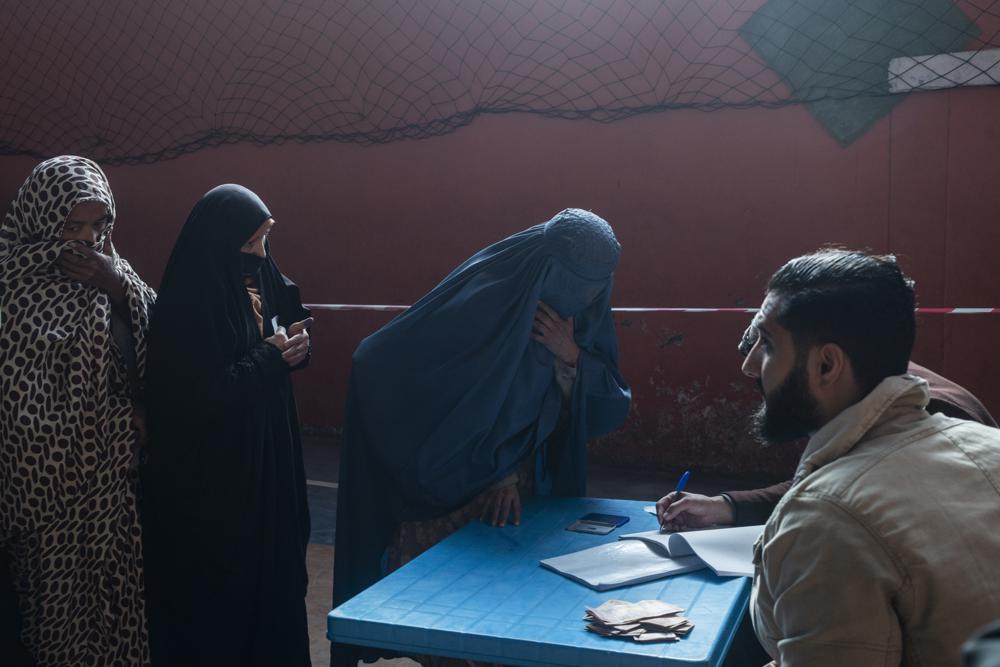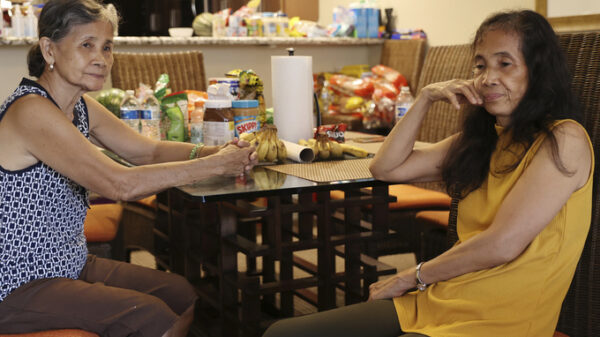An Afghan woman resisters her name to receive cash at a money distribution center, organized by the World Food Program in Kabul, Afghanistan on Wednesday, Nov. 17, 2021. With the U.N. warning millions are in near-famine conditions, the WFP has dramatically ramped up direct aid to families. (AP Photo/Petros Giannakouris)
KABUL, Afghanistan (AP) — Not long ago, Ferishta Salihi and her family had enough for a decent life. Her husband was working and earned a good salary. She could send several of her daughters to private schools.
But now, after her husband lost his job following the Taliban takeover of Afghanistan, she was lined up with hundreds of other Afghans, registering with the U.N.’s World Food Program to receive food and cash that her family desperately needs just for survival.
“We have lost everything. We’ve lost our minds,” Salihi said after her registration was complete. With her was her eldest daughter, 17-year-old Fatima, whom she had to take out of school. She can’t afford to pay the fees at a private school, and the Taliban so far are not allowing teenage girls to go to public schools.
“I don’t want anything for myself, I just want my children to get an education,” Salihi said.
In a matter of months as Afghanistan’s economy craters, many stable, middle-class families like Salihi’s have plummeted into desperation, uncertain of how they will pay for their next meal. That is one reason the United Nations is raising alarm over a hunger crisis, with 22% of the population of 38 million already near famine and another 36% facing acute food insecurity – mainly because people can’t afford food.
The economy was already in trouble under the previous, U.S.-backed government, which often could not pay its employees. The situation was worsened by the coronavirus pandemic and by a punishing drought that drove up food prices. Already in 2020, nearly half of Afghanistan’s population was living in poverty.
Then the world’s shutdown of funding to Afghanistan after the Taliban’s Aug. 15 seizure of power pulled the rug out from under the country’s small middle class. International funding once paid for much of the government budget — and without it, the Taliban have largely been unable to pay salaries or provide public services. The international community has not recognized Taliban rule, demanding the militants form a more inclusive government and respect human rights.
International aid also fueled projects around the country that provided jobs, most of which are now on hold. The country’s banks are cut off from the international banking system, further snarling the private sector. The country’s economy is estimated to have contracted 40% in just three months.
Hospitals are seeing increasing numbers of emaciated, malnourished children, mostly from the country’s poorest families who were already barely getting by.
Now families that have seen their once-stable livelihoods wrecked also find themselves with nothing and must scrape for ways to cover costs of food, rent and medical expenses.
Salihi’s husband once made around 24,000 Afghanis ($264) a month working in the logistics department at the World Bank’s office in Kabul. But after the Taliban took power, the World Bank halted its projects. The 39-year-old Salihi said her husband was told not to come to the office and he hasn’t received his salary since.
Now she is the family’s only source of income. One of her neighbors has a business selling nuts, so they give her bags of nuts to shell at home and she then sells the shells to people who use them to burn for fuel.
Her husband, she said, spends his day walking around the district looking for work. “All he can do is measure the streets with his steps,” she said, using an expression for someone with nothing to do.
The U.S. and other international donors are funneling money to Afghanistan for humanitarian aid through U.N. agencies, which ensure the money doesn’t go into the coffers of the Taliban government. The main focus has been on two tracks. The U.N. Development Program, World Health Organization and UNICEF are working to directly pay salaries to doctors and nurses around the country to keep the health sector from collapsing. The WFP, meanwhile, is providing direct cash aid and food to families, trying to keep them above water.
The WFP has had to ramp up its program dramatically. In 2020, it provided aid to 9 million people, up from the year before. So far this year, that number has risen to nearly 14 million, and the rate has risen sharply each month since August. Next year, the agency aims to provide for more than 23 million people, and it says it needs $220 million a month to do so.
It’s not just the poorest of the poor, usually based in rural areas, who need help. “There’s a new urban class of people who up until the summer would have been drawing a salary … and now are facing hunger for the first time,” said Shelley Thakral, the WFP spokesperson for Afghanistan.
“People are now having to scavenge for food, they’re skipping meals and mothers are forced to reduce portions of food,” she said.
Last week, hundreds of men and women lined up in a gymnasium in a west Kabul neighborhood to receive a cash distribution – 3,500 afghanis a month, about $38.
Nouria Sarvari, a 45-year widow who was waiting in line, used to work at the Higher Education Ministry. After the Taliban came to power, they told most women government employees to stay home. Sarvari said she hasn’t received a salary since and she’s struggling to keep food on the table for her three children still living with her.
Her 14-year-old son, Sajjad, sells plastic bags in the market for a little cash. Sarvari says she depends on help from neighbors. “I buy from shopkeepers on credit. I owe so many shopkeepers, and most of what I receive today will just go to paying what I owe.”
Samim Hassanzwai said his life has been overturned completely over the past year. His father and mother both died of COVID-19, he said. His father was an officer in the intelligence agency and his mother was a translator for an American agency.
Hassanzwai, 29, had been working in the Culture Ministry but hasn’t gotten a salary since the Taliban came to power. Now he’s jobless with his wife and three children as well as his four younger sisters all dependent on him.
“I had a job, my mother had a job, my father had his duties. We were doing fine with money,” he said. “Now everything is finished.”
Copyright 2021 Associated Press. All rights reserved.





























You must be logged in to post a comment Login